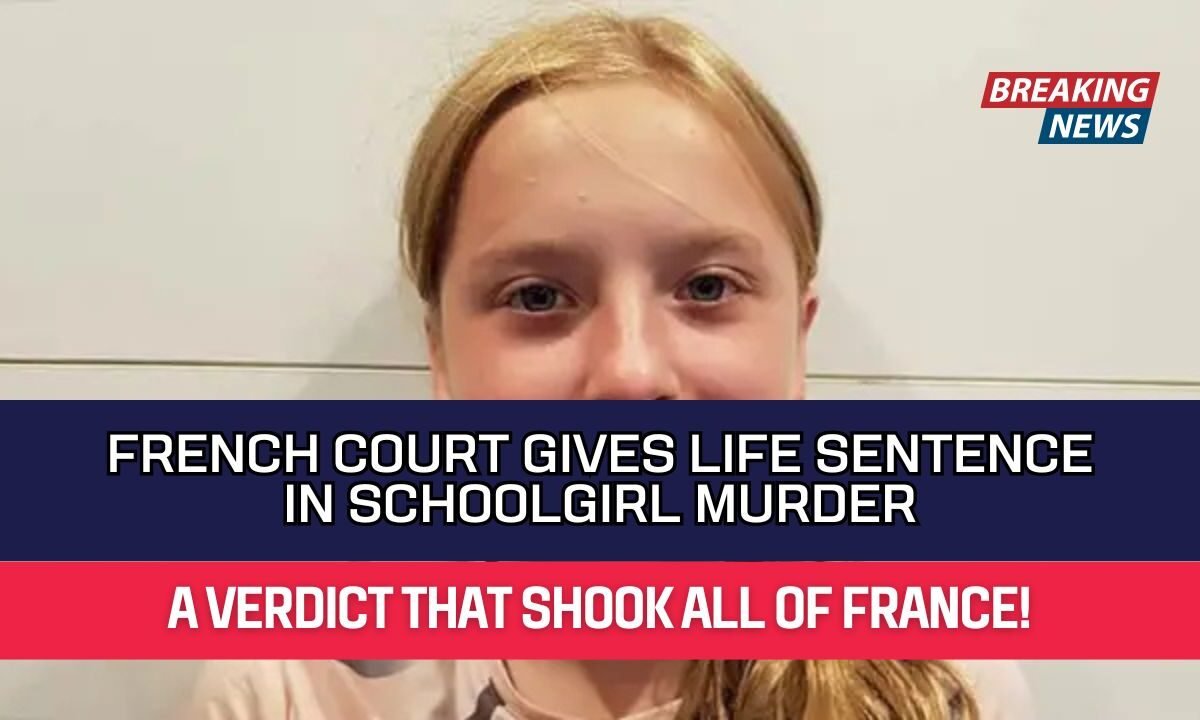A French court has handed down a historic life sentence without parole to a 27-year-old Algerian woman found guilty of raping, torturing, and killing a 12-year-old schoolgirl in Paris.
This is the first time a woman in France has received the country’s maximum punishment, marking a major moment in French legal history.
The Crime That Shocked France
In October 2022, 12-year-old Lola Daviet went missing in northeast Paris. Her parents, who worked as caretakers in an apartment building, raised the alarm when she failed to come home from school. Soon after, her body was discovered in a trunk inside the same building.
The suspect, Dahbia Benkired, an Algerian national, was arrested within hours. Investigators found that she had no legal right to remain in France. Her student visa had expired, and she ignored official orders to leave the country.
The Investigation and Evidence
Security footage showed Benkired talking to Lola outside the building and then leading her inside. Later, witnesses saw her carrying a large trunk wrapped in a blanket. Inside that trunk, police discovered the young girl’s body.
According to court findings, Benkired brutally raped and tortured the victim using scissors and a box cutter before binding her with duct tape, including over her face. The cause of death was asphyxiation, meaning the child suffocated because she could not breathe.
When questioned, Benkired admitted her “horrible” actions but claimed she was not in her right mind. However, psychiatric experts testified that while she had psychopathic tendencies, she was fully aware of her actions and mentally fit to stand trial.
The Court Verdict
During the trial, the judge described the act as one of “extreme cruelty” and “total dehumanisation.” The court called the incident “true torture” that caused unspeakable suffering to the victim and her family.
The final ruling sentenced Benkired to irreducible life imprisonment, which means she can never be released or apply for parole. This is the harshest punishment under French law and has only been given four times before—always to men.
Lola’s mother said after the verdict, “We believed in justice, and we got it.” Her brother added, “We have restored my sister’s memory and the truth.”
Key Facts About the Case
| Detail | Information |
|---|---|
| Victim | 12-year-old Lola Daviet |
| Accused | 27-year-old Algerian woman, Dahbia Benkired |
| Year of Crime | 2022 |
| Location | Northeast Paris |
| Cause of Death | Asphyxiation (suffocation) |
| Sentence | Life imprisonment without parole |
| Notable Fact | First woman in France to get this maximum punishment |
Political and Social Reactions
The case caused national outrage and sparked heated political debate about immigration laws. Many right-wing and far-right politicians demanded stricter immigration enforcement, arguing that the crime could have been prevented if deportation rules were properly followed.
However, the victim’s family urged political leaders to stop using their daughter’s death for political gain. They said their only wish was for justice and for Lola’s memory to be respected.
Benkired’s background revealed a troubled past—she had grown up in a broken family, suffered from domestic violence, and never managed to settle into a stable life in France. Despite her claims of emotional instability, the court ruled that her actions were deliberate and inhuman.
What Makes This Sentence Unique
France introduced the “irreducible life sentence” in 1994 for the most serious crimes such as terrorism, serial killings, and child murders. It means the person will spend the rest of their life in prison and cannot seek early release.
Even after 30 years, they can only ask a judge to review the sentence, but approval is very rare.
The sentencing of Dahbia Benkired marks a historic and painful chapter in French legal history. It highlights the country’s zero tolerance for crimes of extreme violence, especially against children.
The decision reflects both the severity of the crime and the deep emotional scars it left on the victim’s family and community.
The case will continue to be remembered as a turning point in the French justice system, raising ongoing discussions about crime, immigration, and mental responsibility.




